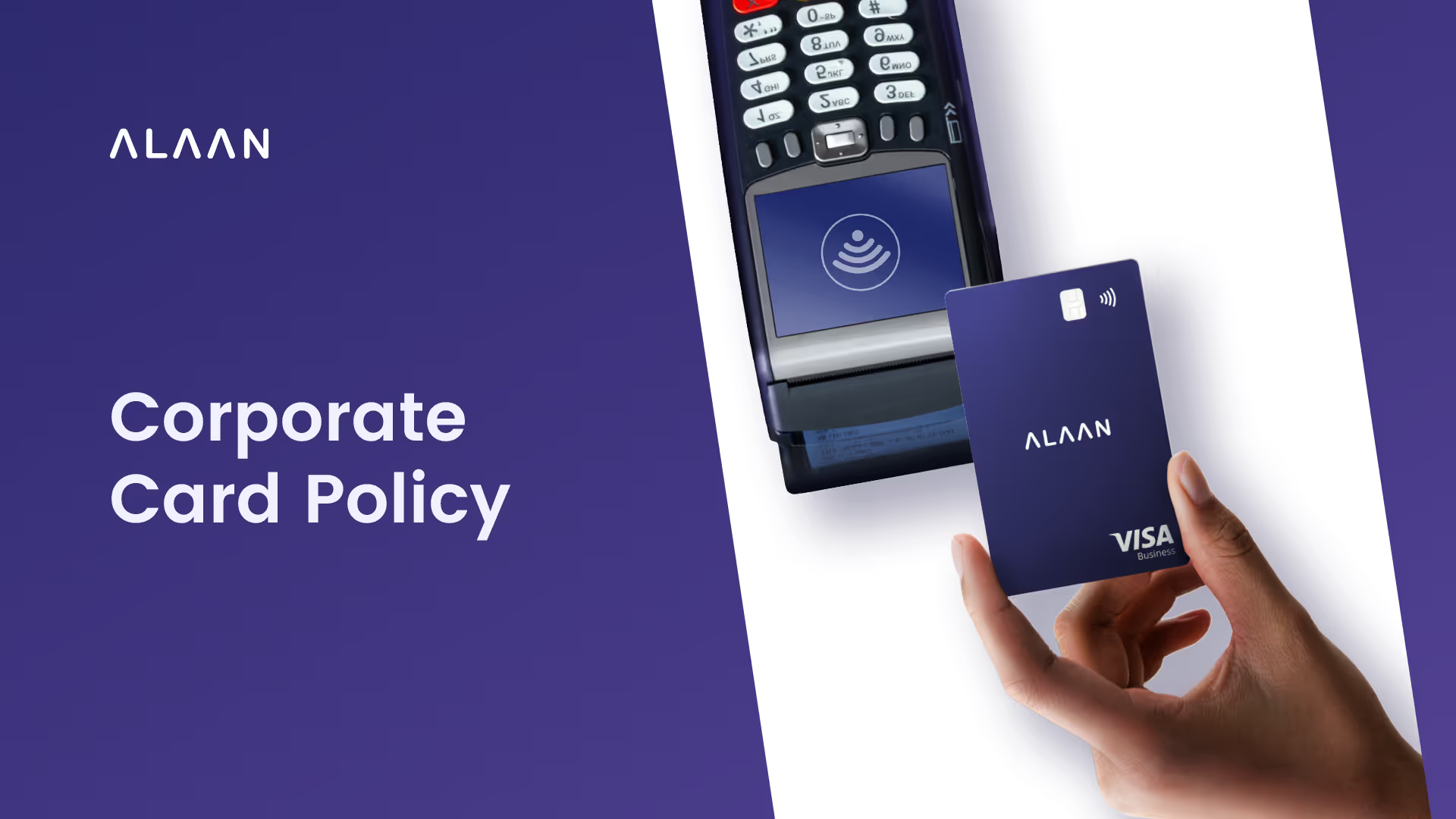Corporate payments are changing rapidly, driven by the increasing demand for efficient, cost-effective solutions. A recent Accenture study underscores this trend, predicting that the global commercial payments market will reach $1.26 trillion by 2028, and corporate cards will be a big part of this growth.
As businesses continue to expand their global operations, the need for reliable and secure payment methods has become more pressing than ever, and corporate cards have become a popular choice.
This rise in popularity is not surprising. Corporate cards eliminate the hassle of petty cash and allow employees to make essential purchases on the go. But with this flexibility comes the responsibility to ensure responsible card use.
That’s where a well-crafted corporate card policy comes in. This blog post will provide a clear roadmap to create an effective corporate card system from scratch. Let’s get started.

What is a corporate card policy?
A company card policy is a set of guidelines that govern the appropriate use of corporate cards by employees. It ensures that the company card is only used for authorised business expenses.
For instance, in some companies, the corporate card policy restricts the use of cards for core business expenses like office supplies and software subscriptions. Employee benefits like lunches and gym subscriptions are either not allowed via the corporate card.
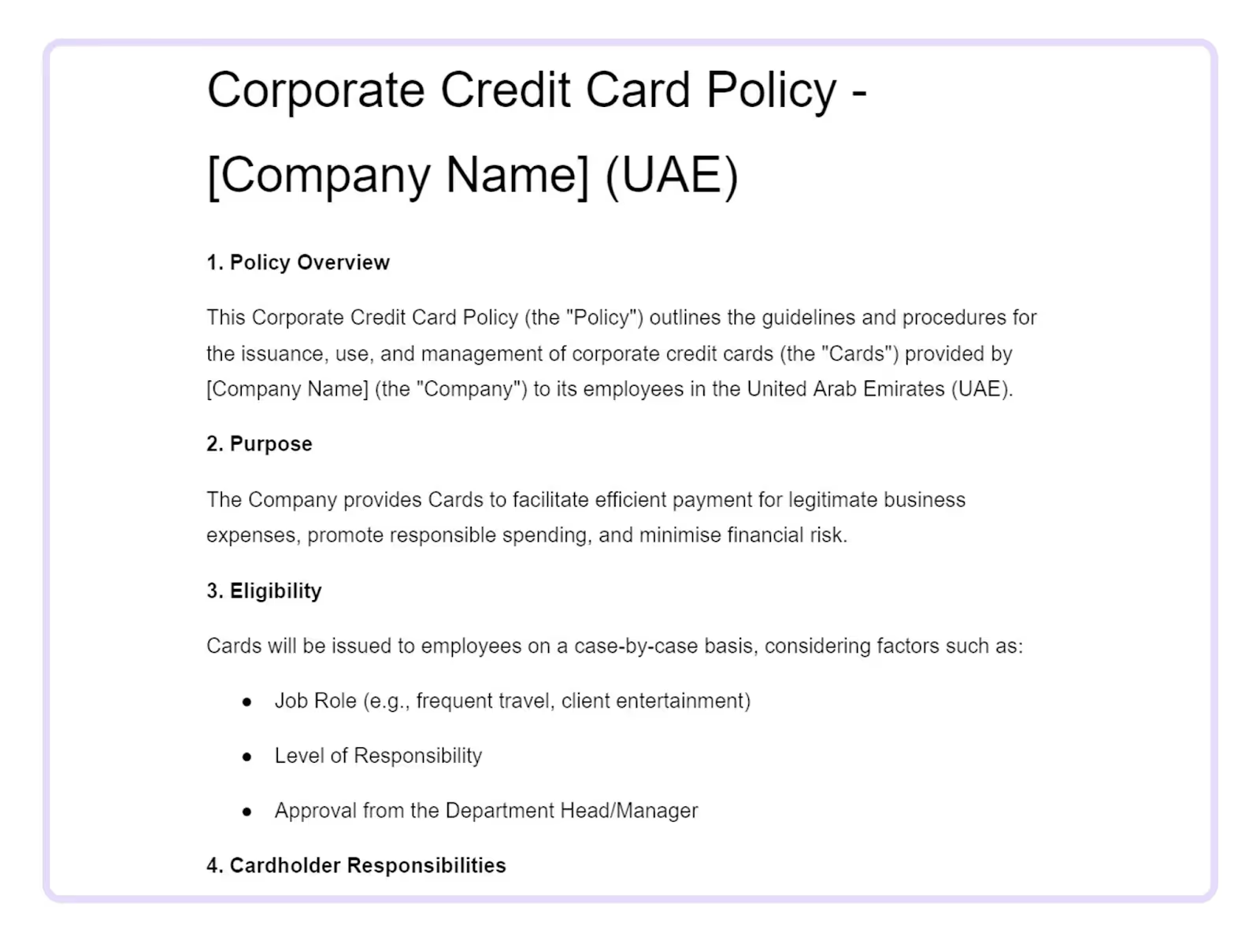
Why are corporate card policies and procedures important?
A well-written corporate card policy acts as a safety net — protecting your finances while helping your employees understand how and when to use the allocated corporate cards. It offers a multitude of benefits, including:
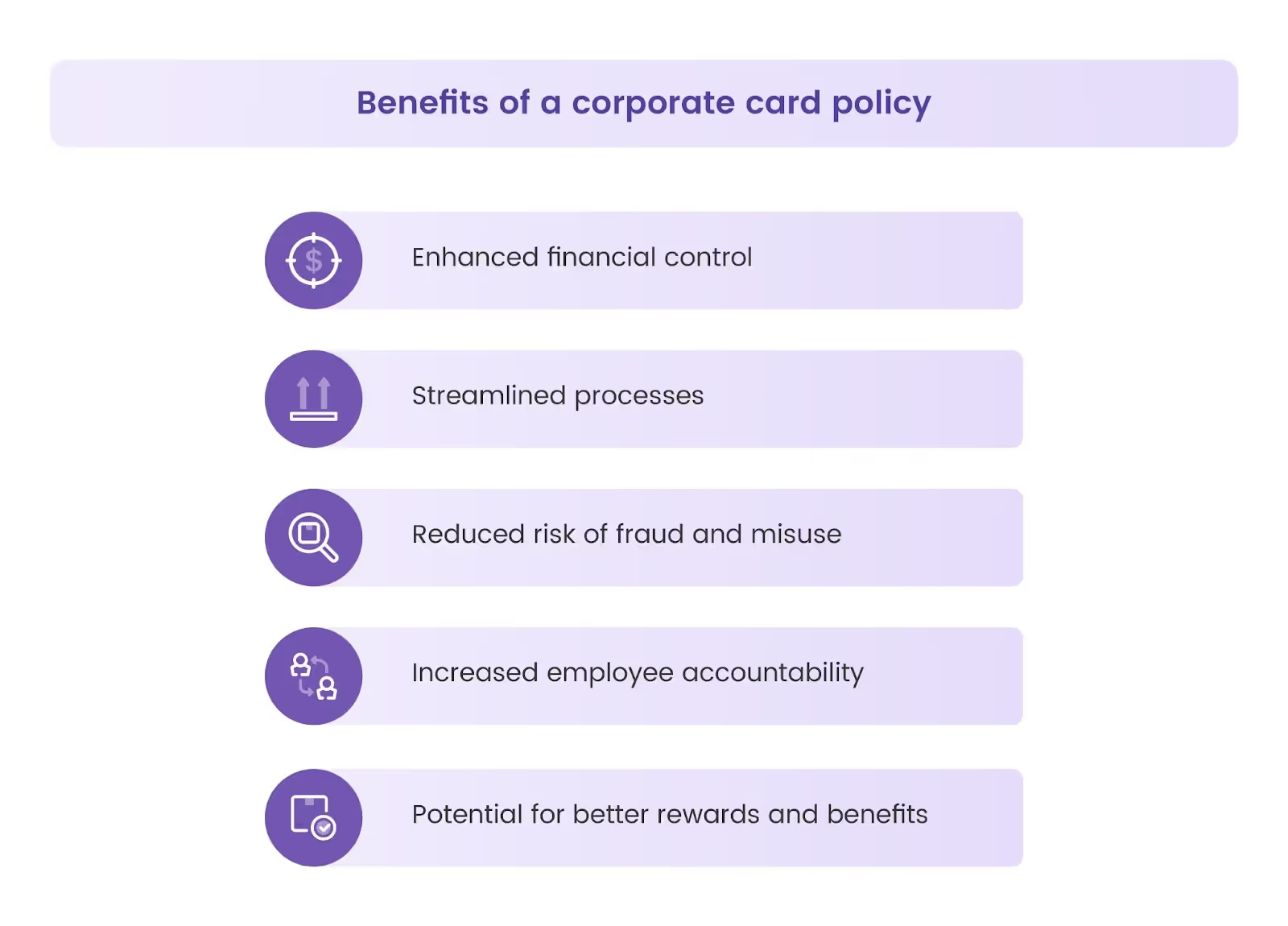
- Enhanced Financial Control: A well-defined corporate card policy sets rules for employee use, covers what expenses are allowed, and sets spending limits. This helps your business manage spending, cut costs, and make smart financial decisions with data.
- Streamlined Processes: Corporate cards can simplify the expense reporting process, saving time for employees and finance teams. This automation also frees up resources for more strategic initiatives.
- Reduced risk of fraud and misuse: One of the most frequent risks associated with corporate employee cards is misuse. Establishing policies reduces this risk, which, in turn, protects your business from financial risks.
- Increased employee accountability: With solid policy guidelines in place, you can ensure that the employees are well aware of all rules and regulations. They would be more accountable for their expenses and make better spending decisions.
- Potential for better rewards and benefits: Responsible use of corporate cards often leads to better rewards. These include cashback or business travel perks from the card issuer. It's a win-win for everyone involved.
Corporate card providers like Alaan offer 2% cashback on eligible foreign transactions. For example, AED 100,000 spent via Alaan on Canva will have AED 2,000 as cashback.

How to draft a solid corporate card policy for employees?
When drafting your corporate card policy for employees, it's essential to create a clear and comprehensive document that outlines the rules, responsibilities, and expectations surrounding company-issued card usage. Think of it as a rulebook that spells out how to handle company-issued cards responsibly.
While creating your policy, remember that it should be a collaborative effort involving key stakeholders from various departments, such as the finance, accounting, HR, and legal departments. This ensures all bases are covered, and the policy aligns with your company's overall goals and values.
Now we know the basics, let's understand the key elements you should include in your corporate card policy:
Cardholder eligibility
Your policy should define who is eligible for a corporate credit card based on job roles, departments, and spending needs. This helps streamline card distribution and ensures only relevant employees can access company cards.
For example, your paid media marketing team or Ads specialists need to make frequent, small payments to test and optimise ad campaigns. A corporate card allows them to act quickly without reimbursement hassles. On the other hand, the social media team might only need to make occasional purchases, such as subscribing to a new tool or design software, which can be managed through a central purchasing process.
By differentiating eligibility, you ensure that the right people have the tools they need and maintain control over spending.
Eligible expenses
Clearly outline the different types of expenses that can be charged to the corporate card. Provide detailed examples to guide employees and prevent misunderstandings. Remember to specify any expenses that are not allowed, such as personal or entertainment expenses unrelated to business activities.
For instance, approved meals and entertainment expenses might include business meals with clients and team lunches, while meals with friends and alcoholic beverages would be excluded.
Spend limits
Your corporate card policy needs to establish spend limits for employees, but there's no one-size-fits-all approach. Each employee's limit should be tailored to their role and responsibilities, reflecting their level of authority and daily duties.
Imagine a sales manager entertaining a potential client. A clear limit on their client's dinner spending (say 300 AED per person) encourages responsible decision-making while providing flexibility. This approach can be applied throughout your organisation.
You can set either a limit per purchase or a total spending cap for specific categories over a set timeframe (cumulative). The best approach might even involve a combination of both! The key is to align card limits with job responsibilities and offer flexibility for unforeseen situations.
Platforms like Alaan let you set spend limits, ensuring you never exceed the specified budget.
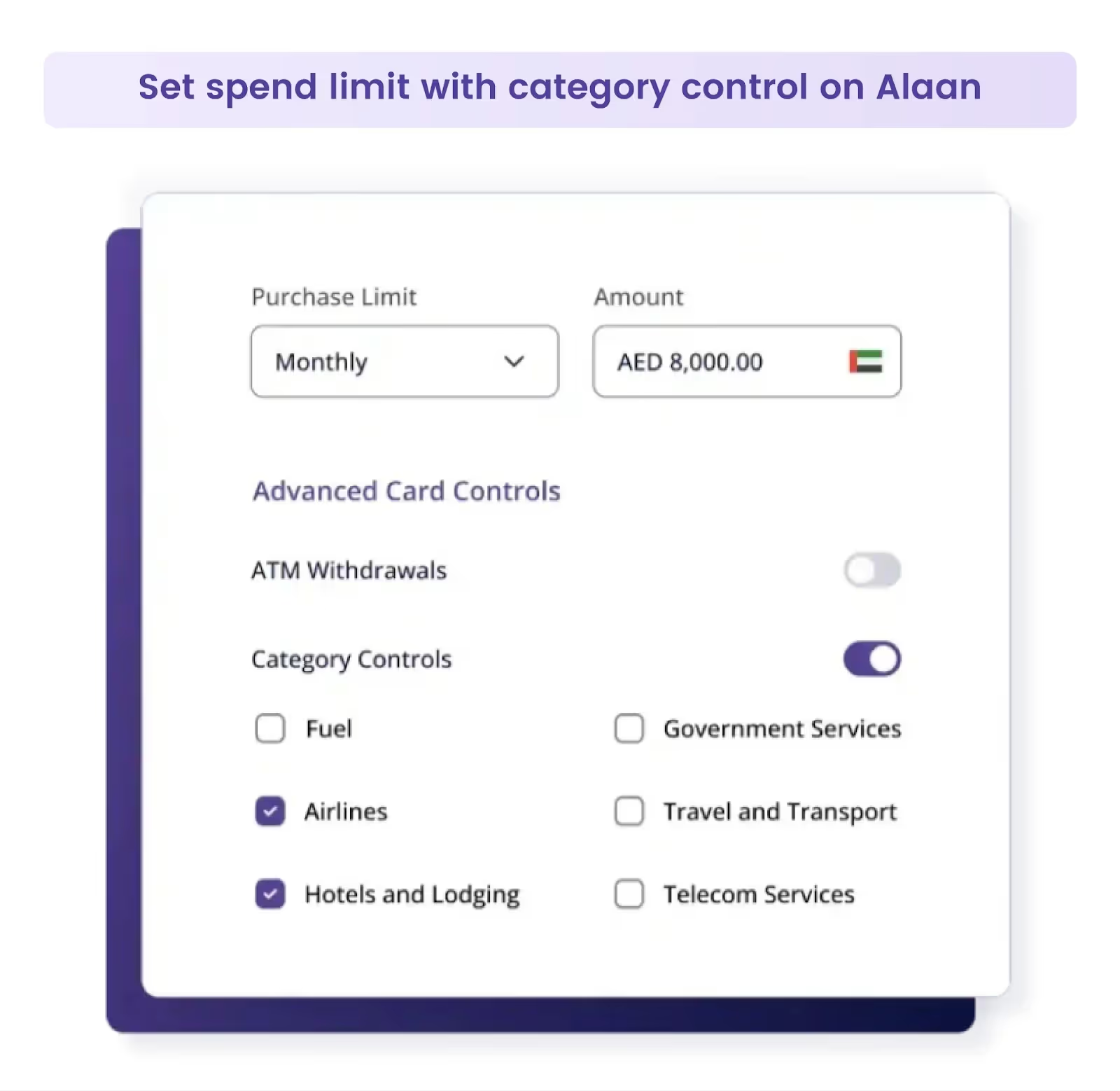
Approval process
Outline the approval process for purchases made with the corporate card. Determine who needs to approve employee expenses and at what level, and make sure to communicate this information clearly to your employees. For instance, let’s say your marketing team identifies an opportunity to promote your brand at an upcoming industry conference. They need to secure a booth and cover some travel expenses, but will this require pre-approval? Your corporate policy should provide the answer.
Consequences
Clearly state the consequences for misuse or abuse of the corporate card. Depending on the severity of the offence, this could include revocation of card privileges, disciplinary action, or even termination of employment. For instance, if an employee uses the corporate card to make large, unauthorised purchases for personal gain, this severe breach of trust would likely result in immediate termination and potentially legal action.
Remember, your corporate card policy should be a living document that evolves with your company's needs. Review it regularly and make updates as necessary to ensure that it remains relevant and effective.
Do you need a headstart on drafting your company card policy? We’ve got you covered. Download our free, customisable template to get your policy off the ground.
Free corporate card policy template

Corporate card policy best practices
As you start creating your corporate card policy, here are some best practices to keep in mind:
- Ensure your policy is written in clear, simple language. It is best to avoid technical jargon and legal terms that might confuse employees.
- Ensure your policy document is up to date. The business landscape is constantly evolving, and your policy must reflect that.
- Conduct training sessions and educate your employees on the set of rules and regulations. Do not assume that the employees will read and understand the nitty-gritty.
- Organise the policy in a logical flow – eligibility, approved expenses, spend limits, record keeping, consequences of unauthorised expenses, etc.
- Consider having a digital format that is easily accessible, preferably added to your expense management platform.
- Include examples throughout the policy document to avoid any misinterpretations.
Bonus Tip! For an extra layer of efficiency, consider integrating your corporate cards with an expense management system. This allows for streamlined reporting, automated compliance checks, and real-time spend insights.
Why choose Alaan corporate cards?
Building a comprehensive corporate card policy goes hand-in-hand with choosing the right corporate card provider. Along with an easy application process and a competitive pricing structure, Alaan offers a suite of features that perfectly complement your commitment to responsible spending and streamlined expense management.

Alaan's automatic receipt attachment and unlimited cloud storage ensure everything is organised and readily available for audits.
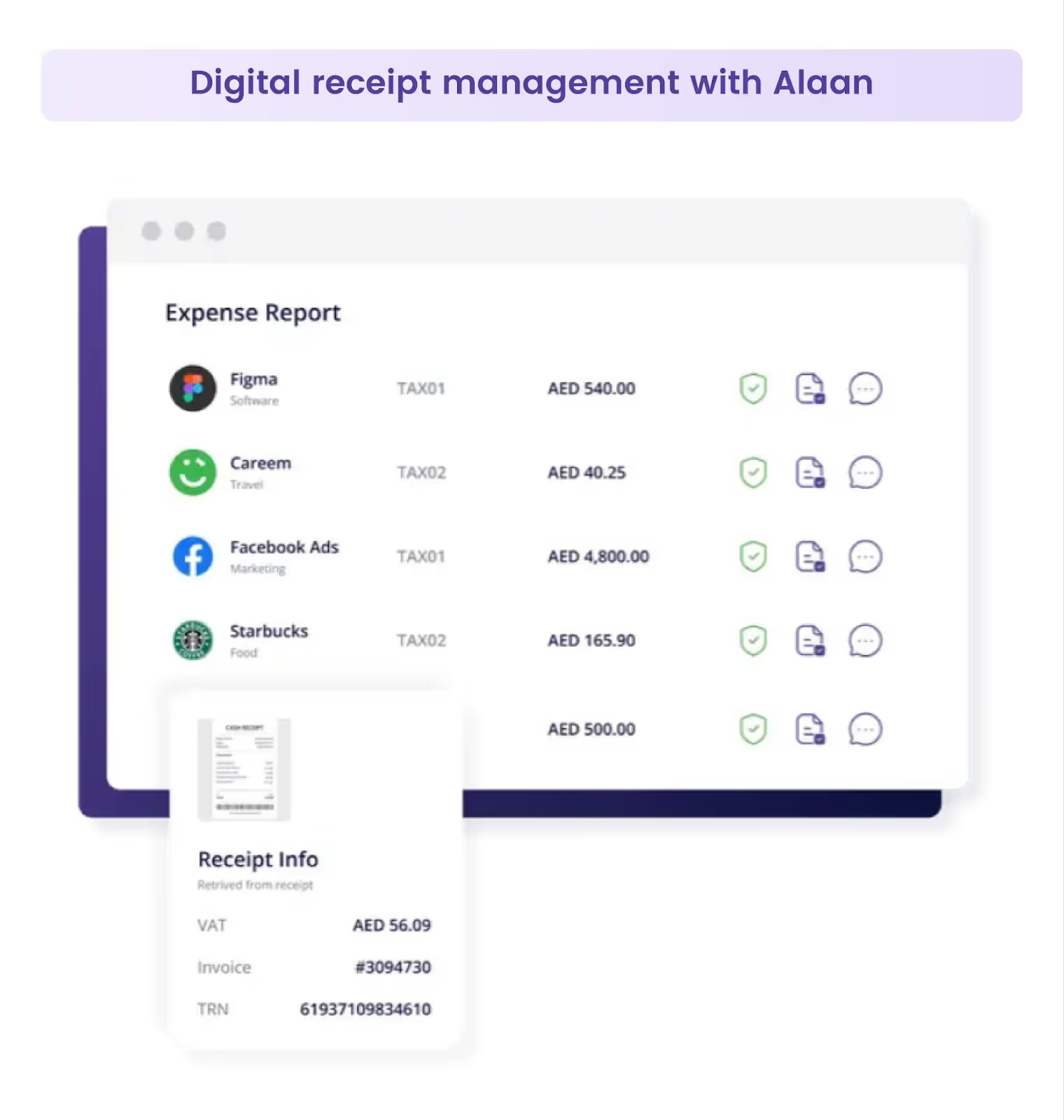
Plus, pre-built compliance features allow you to set up business rules and automate expense approvals based on employee groups, projects, and spending categories. This ensures every transaction adheres to your company's policies.
Ready to streamline your corporate spending and empower your team? Get in touch with us today!


.avif)


